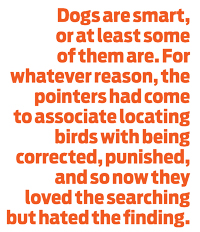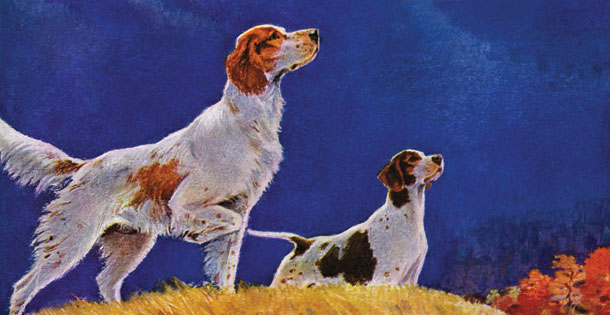
An attorney from over in Hattiesburg had dropped off the pointers the day before, paying up front for a month’s worth of schooling, and this morning was Wayne’s first chance to work with the two dogs in the 10-acre field behind the house. Wayne’s training ground. Over the summer he’d planted the big field with strips and patches and blends of soybean and lespedeza, clover and ragweed. That was before his grandson moved in, and Wayne doubted he had many break-back, no-help summers left in him. Fifty-eight is fifty-eight.
It was early, not so long after sunrise, but Wayne already had a hen quail from his flight pen hidden about dead center in the cold, green field. She was cooped inside a little metal cage about the size of a shoebox. The two English pointers were mostly cream, but the female had lemon spots, the male scattered blotches of liver. The dogs were blinkers, or so the Hattiesburg man had said, and Wayne led them from the kennels to see what was what.
When he was about 20 yards into the field Wayne unclipped their leashes and walked along after them. The field was slick with dew, and he had his jeans tucked down into his boots. He stopped to watch the dogs. They were young, littermates not yet a year old, but they worked the field pretty well. The both of them liked to hunt, that was clear enough, and as they got closer and closer to the stashed quail Wayne started to question whether their owner had it right about them.
The lemon was the first to play dumb, blink. Her name was Holly. She passed within about 15 yards of the hidden quail, cocked her head, but then veered off in the opposite direction without ever coming to point or acting too birdie. A half minute later the liver, Rebel, did the same thing. On the phone a few days ago the Hattiesburg man had played dumb himself, telling Wayne he couldn’t make any sense of it, but Wayne suspected the man had been too hard on his dogs too soon — maybe with a shock collar or maybe with a switch, but even a harsh tone or too much blowing on the whistle could do it. Dogs are smart, or at least some of them are. For whatever reason, the pointers had come to associate locating birds with being corrected, punished, and so now they loved the searching but hated the finding. Still, their instincts seemed good, and Wayne figured he’d be able to bring them around. With time and patience and praise, he usually could fix a blinker.
Wayne whistled the pointers in and turned for the house, hoping to catch Justin before he left off for school. Wayne wanted to wish him good luck in the football game tonight, but over by the house he could see vapor already lifting from the tailpipe of his grandson’s truck. The Ford rolled down the driveway and then onto the gravel road that ran alongside the field. Wayne never saw much of the kid — Justin seemed to always be coming or going — but he supposed that so far things were working out OK. The horn sounded, and Wayne waved good-bye.
He put the dogs in the kennel and then went into the house. It was a single-story redbrick he’d moved into 20 years ago, right after his divorce. Linda had left him for a schoolteacher and lived in Mobile now. Their son Mark had taken Wayne’s side yet still kept in touch with her — Justin did too, for that matter — but Wayne hoped that he himself would never see her again. All seeing her ever did was remind him of things he never wanted to be reminded of. It was years before he could close his eyes at night and not see what he saw one summer day when he came home early from work. Her hands on another man’s back — Justin’s math teacher — her thighs pressed against his hips.
Wayne had retired back in 2005 after putting in 30 years with the highway department, but dog training kept him busy — or at least occupied, distracted. He poured a cup of coffee and then went back outside. He was planning to take the pointers over to that quail one at a time on a long nylon lead, try and get it in their heads that this was what their lives were all about, that this was the thing they were born to do.
There were five other dogs in the kennel. Two of Wayne’s own English pointers, plus three setters he was just about done training. He put Holly on the lead and walked her toward the field. There was a red hawk out there. It was standing atop his distant, hidden quail cage and pecking at that hen.
Midway through the fourth quarter, Justin dropped a long pass that could’ve more or less sealed things for Homer High. The crowd in the bleachers, even Wayne and the other top-rowers, had gone from sitting to standing when the ball left the quarterback’s hand. The pass was a little wide but still catchable, and the town groaned as the tight spiral careened off Justin’s fingertips.
The quarterback was one of Homer’s black players. The team was split about half and half, same as the fans, same as the town, and everyone went slumping back to their seats except for a grade-school kid in a gray Colonels jersey two rows below Wayne. “Dang, white boy,” the boy said, stuttering a little, but then his mother tugged him down by his belt and shushed him.

Wayne winced. Justin was harder on himself than any teenager had a right to be, and this was the sort of thing that could sink him for days. Their quiet house would be even quieter now. Justin had moved in with him at the beginning of August. Two months earlier his father had left Homer with their family to take a job at the Nissan plant outside of Jackson, but it had been agreed, finally, that Justin could return to finish out high school in the town where he’d been raised. Wayne knew that Mark and his wife weren’t happy about it — and Linda neither, he supposed — but the boy wanted to graduate in a familiar place, and in the end Justin got his way. It was the only time Wayne had known Justin to take a stand about anything.
Terry Tompkins was sitting to one side of Wayne, Pete Strain to the other. Halloween was still three days off, but a lot of the kids were dressed up anyway. Wayne watched a cowboy lead a nurse down the steep bleachers. It was a cold night for South Mississippi. The girl was shivering.
“Almost,” said Terry. “Would’ve been a tough grab.”
Pete nodded. “He’s been blocking his tail off tonight, Wayne. Be sure and tell him that.”
Wayne nodded but said nothing. Later, the game over, he sat parked in the blacktop lot outside the locker room, the stadium lights slowly fading behind him like clusters of dying stars. Justin’s drop had wound up not costing the team — Homer won the game on their very next possession, with a keeper bootleg Darnell Free took 60 yards down the field. Still, Justin wouldn’t be able to bury it. Wayne knew that. The losing season would be over soon, and though he’d never admit it to Justin, Wayne was glad. One more game, and then Justin would finally be done with these games.
His grandson was a long time coming out of the locker room, but Wayne forced himself to stick around. He saw the boy shake his head when he spotted him in the truck. Wayne rolled down the window. Justin was a big kid, as big as Wayne had been at that age, and he walked with the loose-limbed ease of an athlete. In September there had been a letter and even a phone call from an assistant coach at the community college in Poplarville, but Homer was having an off year and nothing more had come of that. Justin had average hands at best. That was just a fact.
Wayne reached out the window and tugged at the front of Justin’s letter jacket. The jacket was gray with white pleather sleeves, looked pretty much the same as the one Wayne had stowed away somewhere in his attic. “Good game, boy,” he said. “I mean that.”
Justin’s blond hair was wet from the showers, and he pushed it back from his face with his hand. “You don’t need to be waiting out here, Grandpa.”
“I know.”
“Coach Gibson just told me he wants to talk to you. He might be giving you a call this weekend.”
“Talk to me?” To Wayne the young coach was a kid, really. This was Gibson’s first year at Homer High. Wayne had never met him. “About what?”
“He didn’t say.”
“You in trouble?”
“I don’t think. You can probably catch him in his office if you want.” Justin pointed back at the gym. “It’s just around the corner there.”
“I’ll find him. See you at the house?”
“I was gonna go by Trey’s. That OK?”
“Don’t get wild. I need you to help me out with a couple of new dogs tomorrow, and maybe we should clean the house up some too.”
“Yessir.”
Wayne hung back for a while, watching as Justin walked over to the line of cars where the other seniors on the team parked. A black girl in a black dress was sitting on the trunk of a sedan parked next to Justin’s Ford, laughing into her cell phone. Her face was painted white, and Wayne took her to be a vampire or some other back-from-the-dead thing.
Become a Saturday Evening Post member and enjoy unlimited access. Subscribe now




Comments
H. V. Stephen Larsson
What a joy to read actual quality lit, to read a real literary short story, a piece within which each element contrives to accentuate the whole—one of the more obvious examples being the psychology of dogs to provide insight into the protagonists awareness, which would obviously spill over into his awareness of human beings. What a setup, what a good opening, a real exposition. This story is packed with such pregnancies of thought, each strengthening the whole. As with any fine art, it takes a couple of good perceivings; in this case, readings, to catch all the nuances so they naturally combine to create an aesthetic depth of awareness. And the subject matter, published when police versus minority relations, fanned to flame by media, is so strongly in our consciousness, shows courage on the part of The Saturday Evening Post. An aging, southern, rural white man, pressured into giving false testimony for the new attitudes of upcoming generations, pressured into espousing attitudes he neither believes in or cares about, is, at this time, a powerful subject to develop literarily. Plus, what a wonderful ending. The discerning reader is left hanging with the thought of what they would say in a few minutes, in this tense, untenable situation, if they were the protagonist who is stuck in it. My thanks to Skip Horack and this publication.
Don’t you people ever provide a piece of fiction (“The Day of the Dead”) that includes some sort of conclusion? It seems like such a waste of time reading through a story that leaves the reader up in the air. I realize your readership is older, but I think they have enough time left to read and appreciate a reasonable denouement before they kick the bucket.
I receive the paper copy of the Saturday Evening Post and was reading the short story by Skip Horack. What happened to the story’s ending? I’m missing pages 88 and 89 of my latest paper edition and the story’s ending is also missing from the internet version. What gives??